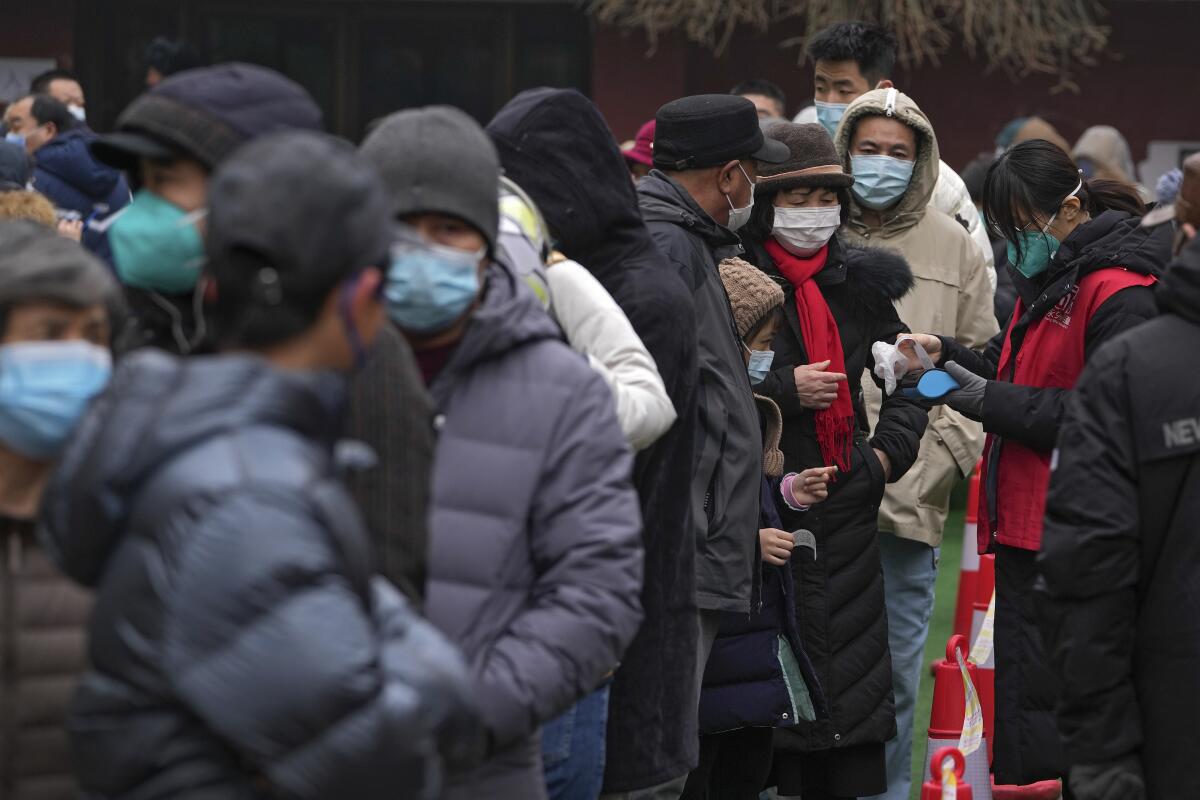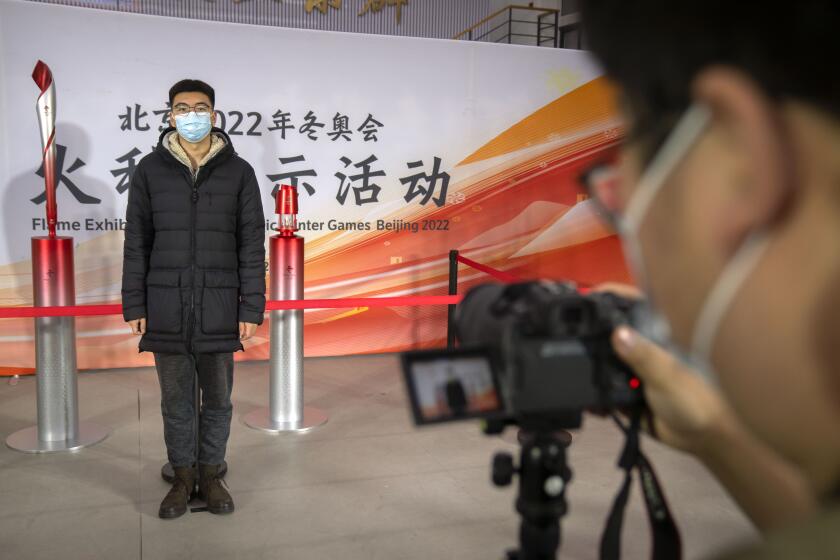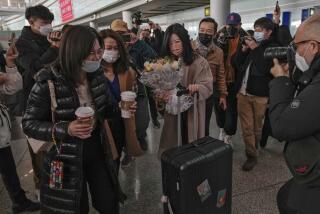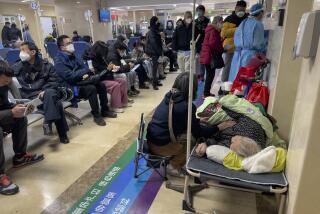As Winter Olympics near, China lifts COVID lockdown in Xian and tests 2 million in Beijing

- Share via
BEIJING — A cluster of coronavirus cases in Beijing has prompted authorities to test millions of residents and impose new measures two weeks ahead of the opening of the Winter Olympics. Elsewhere in China, officials in Xian lifted a monthlong lockdown Monday on the city’s 13 million residents.
Officials in Beijing said they would conduct a second round of mass testing of the Fengtai district’s 2 million residents, where the majority of the capital’s 40 coronavirus cases since Jan. 15 have been found. That came a day after authorities announced that anyone who buys or who has bought fever, cough or certain other medicines in the past two weeks would be required to take a COVID-19 test within 72 hours.
The stringent measures, despite a relatively low coronavirus caseload, illustrate the acute concern of government officials in the run-up to the Olympics, which open in Beijing on Feb. 4.
“The current epidemic prevention situation is still grim and complicated, and all departments across the city must act proactively and swiftly,” Beijing city spokesperson Xu Hejian said.
“The overall situation is controllable,” he added.
The ruling Communist Party’s “zero tolerance” COVID-19 policy mandates lockdowns, travel restrictions and mass testing whenever a case is discovered. Anti-coronavirus measures have intensified in the past month with lockdowns in Xian and two other cities, and the partial suspension of train and plane routes to Beijing to stop travel from areas with outbreaks.
The Olympic flame will be displayed only in enclosed venues deemed ‘safe and controllable’ ahead of the opening of the Beijing Winter Games.
Overall, the number of reported new cases has been falling in China from more than 100 a day at the peak of the Xian outbreak to 18 on Sunday, six of which were in Beijing. Despite the drop, pandemic controls remain stepped up ahead of the Olympics, where all participants will be tested every day and be completely isolated from the general public.
On top of a first round of mass testing in Beijing’s Fengtai district, targeted testing was conducted Sunday at residential communities in six other districts, the Beijing Daily reported. It wasn’t fully clear who was being tested. The newspaper said that in one community, an official said that if a resident had been to a high-risk area in Fengtai or Fangshan, another affected district, occupants of the person’s entire building would have to be tested twice.
The government told people in areas of Beijing deemed at high risk for infection not to leave the city. A number of nearby provinces reported cases linked to the outbreaks in the capital, including Shandong and Hebei provinces. The industrial city of Shenyang, in Liaoning province, reported a positive test result in a person with no symptoms, a case that was also related to the Beijing clusters.
Beijing officials said an Omicron cluster that infected six people had been brought under control. The Fengtai outbreak is Delta-driven, and Chinese health officials have alleged that it is linked to imported frozen food.
Pang Xinghuo, deputy director of the Beijing Center for Disease Control, said that gene sequencing of virus samples from the frozen food was consistent with that in 28 infected people. Foreign experts are skeptical that the coronavirus can spread easily from packaging.
The announcement Monday of the end of lockdown in Xian followed the resumption of commercial flights from the city over the weekend. Xian, a major tourism center and former imperial capital famed as the home of the terra cotta warriors, struggled to get food to some residents in the early days of the lockdown, after people were confined to their homes.
The NHL withdraws from the Beijing Winter Olympics with its regular-season schedule disrupted by coronavirus outbreaks.
Access to Xian was suspended Dec. 22 following an outbreak attributed to the Delta variant of the coronavirus. Xian is about 600 miles southwest of Beijing.
Other outbreaks prompted the government to impose travel bans on a number of cities, including the port of Tianjin, about an hour from Beijing. The stiff regulations are credited with preventing major nationwide outbreaks, and China has reported relatively few cases of the highly infectious Omicron variant.
The country Monday reported just 18 new cases of local infection, including six in Beijing. China has 2,754 current cases of infection and has reported a total of 105,660 cases with 4,636 deaths.
The Olympics are being held under strict controls that are meant to isolate athletes, staff, reporters and officials from residents. Athletes are required to be vaccinated or undergo a quarantine after arriving in China.
From Jan. 4 through Sunday, more than 3,000 people have arrived for the Games, including more than 300 athletes and team officials, organizers said Monday. The rest are media and other participants. So far, 78 people have tested positive, including one who was an athlete or team official. China has waived the usual 21 days of hotel quarantine for those coming for the Olympics.
The International Olympic Committee announced Monday some changes in the COVID-19 policy for the Games, including a reduction of the period that an infected person is considered a close contact, from 14 days to seven.
More to Read
Sign up for Essential California
The most important California stories and recommendations in your inbox every morning.
You may occasionally receive promotional content from the Los Angeles Times.












